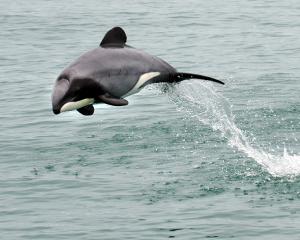As well as the usual student services and events to oversee, the organisation is in the middle of an internal restructuring, is mounting a legal appeal over the university's Code of Student Conduct document, is working through vice-chancellor Prof Sir David Skegg's sudden decision last year to ban alcohol advertising and sponsorship on campus, and is continuing to try improving student behaviour at activities such as Orientation Week and the Undie 500.
As if that was not enough, student associations are facing political rumblings about the possible reintroduction of interest on student loans and the biggest threat of all to their existence - voluntary membership legislation which, if enacted, would erode their membership base and income.
OUSA president Harriet Geoghegan knows she has signed up for a busy year, but says she is ready.
Still only officially one month into her 12-month stint, she has spent the time since her election last August working on strategies to ensure her year is productive.
Ms Geoghegan was writing articles for student magazine Critic and reading the news on Radio One when she was asked to stand for the OUSA executive in a by-election last May.
She said it took some time to decide to stand for the presidency.
"It took a good few months of convincing, a lot of it from Edwin [Darlow, the 2009 president] and a lot of it from one of my good friends, Stephanie Reader.
At first I thought: 'No, no, I'm not going to take a year off my studies.' "But the more I thought about it, the more I thought of all the projects I had got started and really wanted to finish. It is so much more interesting working on something which produces a tangible result than studying or completing an assignment.
"Also, I'm not entirely sure when I am going to end up after university . . . so it will be a good year of great learning experiences."
The projects she had begun were restructuring the executive and implementing a new strategic plan for the organisation.
Both turned out to be much bigger projects than anticipated and would continue this year, she said.
Fighting MP Sir Roger Douglas' Voluntary Student Membership Bill (VSM) would be her top priority.
At present, all students must join a student association, but the Bill would end that.
The economic impact of VSM would be immense, she said.
Advocacy and welfare services no longer able to be provided by student associations would have to be picked up by universities and would eventually be paid for by students in some other way, she said.
"The philosophical argument is students should not be compelled to join a union. But we are not a union so much as a service provider. Ultimately, if you look at it, student associations do things a lot cheaper than if they were run by the university, so VSM could cost the students more. While there is a philosophical debate, I think it is outweighed by the economical practicality of it all."
Another major priority was trying to ensure students' experiences while at Otago were well-rounded and not alcohol-focused, Ms Geoghegan said.
Following last year's disastrous Orientation toga parade which degenerated into chaos, this year's parade has been cancelled and replaced with a toga party in a venue which could be controlled.
She favours a similar approach to the Undie 500 weekend, which involves University of Canterbury students travelling to Dunedin in old cars.
Although rally organisers have said they will not come to Dunedin again, Ms Geoghegan is making plans, just in case.
"I'm certainly not going to cross my fingers and hope nothing happens."
Ms Geoghegan said she supported fencing off part of Castle St, where the Undie 500 street party is traditionally held, and controlling the event with bar staff and security.
She was also keen to follow through on Mr Darlow's suggestion of a night-time concert during the Undie 500 weekend.
She also supported a scheme open to all students - a Scarfie Card proposed by campus group Student Life where students redeemed hours of volunteer work and community service for for prizes.
"It is a cool idea and a step in the right direction to give students a bit more to do than just sitting in their flats drinking.
"I don't expect to get every single student involved, but it will be something people will hear about and which we hope will grow."
Ms Geoghegan said she wanted to continue working with the university and the Dunedin City Council on joint approaches to improve student behaviour and reduce the focus on alcohol consumption.
However, trying to ignore student drinking would not work, she said.
"The problem with 18- and 19-year-olds who have just left home is a lot of them think: `I'm out there, I'm a big kid and no-one's going to tell me what to do any more'.
"Taking a stamp-the-problem-out approach is not really helpful, because it just gets students reacting and fires them up a lot more."
Harriet Geoghegan
Age: 21.
Educated: Samuel Marsden College, Wellington.
Moved to Dunedin: 2007.
Studying: Law and commerce.
Interests: Socialising with friends, piano, social netball.











